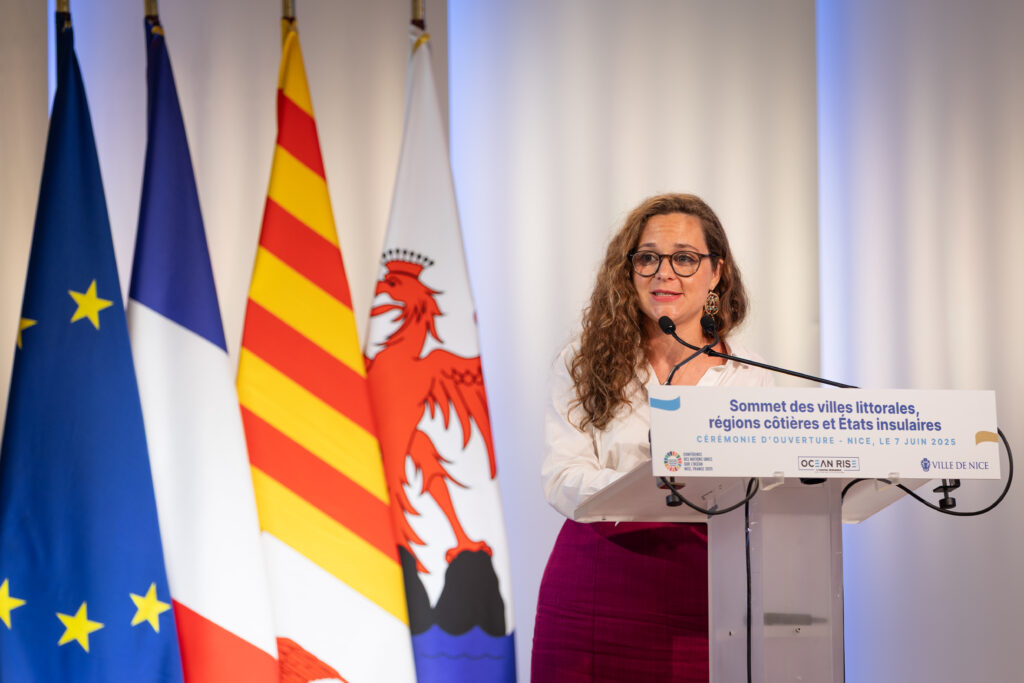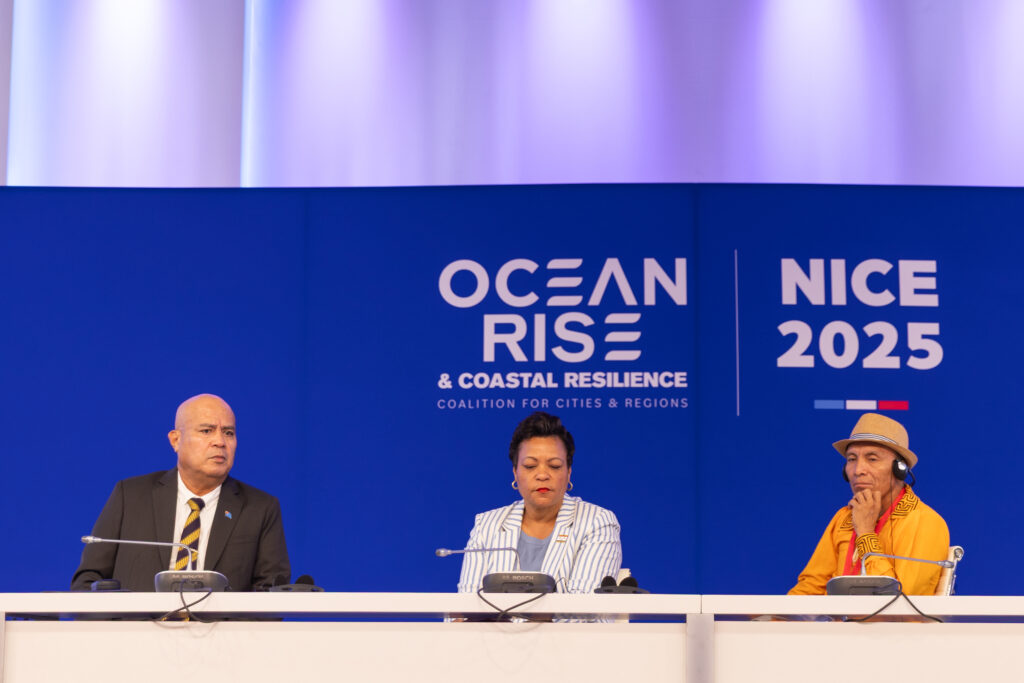New advocacy, scientific and financial opportunities for coastal cities and regions announced at the Ocean Rise & Coastal Resilience Summit (UNOC3)
From the 9th to 13th of June, 2025, while the global community convened in Nice for the 3rd United Ocean Conference (UNOC3), more than 1,200 participants arrived on the 7th for one of the three Special Events of the Conference: the Ocean Rise & Coastal Resilience Summit.
Organised by the Ocean & Climate Platform, the City of Nice with the support of the Global Centre for Climate Mobility, the Government of France and of Costa Rica, the Summit placed coastal adaptation and resilience to rising sea levels at the centre stage of the international agenda.
With over 200 local leaders from coastal cities and regions attending, the Summit was a strong symbol of “the mobilisation of all local actors around the world—not only those directly affected, but also those capable of leading the way in building solutions,” as French President Emmanuel Macron emphasised during the opening ceremony of UNOC3.
Significantly, the Summit marked the launch of the Ocean Rise & Coastal Resilience Coalition—a decisive step toward transforming commitment into concrete action on sea level rise. This momentum was reinforced by several key announcements of new scientific and financial opportunities for coastal cities and regions.
Launch of the Ocean Rise & Coastal Resilience Coalition to accelerate the adaptation of coastal cities and regions to sea level rise
“Spread the word of our efforts here in Nice to defend our culture, history, heritage, and territories” called Christian Estrosi, Mayor of Nice, as he opened the Summit with the launch of the Ocean Rise & Coastal Resilience Coalition which he will be chairing. This new Coalition will be dedicated to accelerating adaptation and resilience to sea level rise. In the words of Loreley Picourt, Executive Director of the OCP, this Coalition will aim to ensure a “livable, inclusive and dignified future for all”, by fostering cooperation between coastal cities and regions as well as all committed organisations, networks and stakeholders across science, finance and civil society.
In line with this, the OR&CR Coalition is the result of a collaboration between the Ocean & Climate Platform, which has been coordinating its development up to UNOC3; the city of Nice, whose mayor, Christian Estrosi, has been entrusted by the French President to chair it for the coming year; the Government of France and Government of Costa Rica as co-hosts of the UNOC3; and the Global Centre on Climate Mobility, which will host the Coalition’s headquarters at the United Nations Office for Project Services (UNOPS). The Coalition is supported by over 20 global institutions, organisations and networks (see below).

All coastal cities and regions committed to adaptation are welcome to voluntarily join the Coalition by signing its Charter. By joining the Ocean Rise & Coastal Resilience Coalition, they make a voluntary commitment to collaborate with national and local governments, as well as key stakeholders, to drive meaningful change and create a thriving, sustainable future for coastal communities. As of today, 40 cities and regions across the globe, like New Orleans (U.S.A), Bora Bora (French Polynesia), Cartagena (Colombia), Valpareiso (Chile), Cape Town (South Africa) or even Grand Bassam (Ivory Coast) have already made this commitment.
The Coalition’s ambition is to empower coastal cities and regions to become driving forces in shaping a sustainable coastal future, by providing them with the resources and support they need following five pillars of action, detailed in the 2025-2028 Action Programme:
- Mobilisation of elected officials and coastal stakeholders to connect and share sustainable adaptation solutions.
- Scientific and local knowledge to inform and guide effective adaptation strategies.
- Capacity-building through strategic partnerships and training opportunities, empowering local actors to lead community-driven adaptation efforts.
- Financing, by engaging public and private financial actors to develop funding mechanisms suited to the specific needs of coastal cities and regions.
- Advocacy for the interests of coastal communities within international governance forums, particularly the UN Framework Conventions on Climate Change (UNFCCC) and Biological Diversity (CBD).
The powerful appeal made by Christian Estrosi, Mayor of Nice and Chair of the Coalition, and LaToya Cantrell, Mayor of New Orleans and Vice-Chair of the Coalition, to “invest in us, [coastal cities and regions] on the frontlines” was strongly echoed by key partners of the Coalition, who announced new scientific and funding opportunities for coastal cities and regions.
Scientific opportunities to support locally-informed adaptation strategies
Throughout the day, the development and accessibility of data—particularly satellite data—were highlighted as key priorities to ensure accurate, up-to-date information and projections on sea level rise.
As the Summit concluded, the European Space Agency (ESA) announced the Coastal Resilience to Climate Change funding opportunity. This funding opportunity aims at supporting the development of innovative space-based services for coastal cities, rural coastal areas, and ports. The call is directed to feasibility studies and demonstration projects lasting 6 months to 2 years, with a funding range of 50,000 to 3 million euros per activity, covering 50%-80% of project costs.
Meanwhile, the French National Centre for Spatial Studies (CNES) launched the Space4Ocean (S4O) Alliance, inviting local leaders of the Coalition to join a dedicated working group to express their operational needs and create tailored services in space data and technologies.
Financial opportunities to invest in resilient coastal communities
The Coalition will be committed to supporting elected officials by raising awareness and building knowledge about available funding opportunities for climate adaptation. In line with this, the French Ministry for Europe and Foreign Affairs has announced during the Summit that it will be launching a new 1 million euros call for projects to support decentralized cooperation initiatives between French and foreign local governments. The focus will be on collaborative adaptation efforts in response to the challenges posed by rising sea levels for coastal cities and regions. Guidelines and applications will open and be published online by the end of June 2025.
Likewise, the European Commission has also presented its newly adopted 45 million euros Horizon Europe Mission Restore our Ocean and Waters Calls 2025, focused on boosting the resilience of vulnerable coastal cities, rural zones and islands through innovation and sustainable transformation.
In addition, the Coalition will aim to make accessible smaller, more tailored grants to local capacities, and to embed these grants in the action of multilateral and bilateral development banks. Specifically, the Global Centre for Climate Mobility (GCCM) announced the creation of a new funding mechanism under the Climate Adaptation Facility for Communities (C-CAF). This fund will offer grants ranging from 15,000 to 100,000 euros to support coastal communities—at the district and municipal levels—in developing their adaptation strategies.
A Ship to carry forward the mobilisation of coastal communities across the globe
The Summit concluded on a hopeful and rallying note as the historic ship Statsraad Lehmkuhl was designated the Coalition’s Floating Ambassador. Between 2025 and 2026, it will visit 26 coastal cities around the world before continuing across the Indian and Pacific Ocean to raise public awareness and build momentum for ocean action.

As the global community rallies behind local leaders at the forefront of adaptation efforts, the momentum built at UNOC3 must translate into sustained financial, political, and scientific commitments. As Mayor LaToya Cantrell aptly stated, “We are all in this together, we need one another.” Echoing this spirit of collective responsibility, Loreley Picourt emphasized during the UNOC3 Closing Ceremony that “adaptation must serve no political project other than the well-being of all—especially the most vulnerable—and bring the whole of society on board toward desirable futures.”

